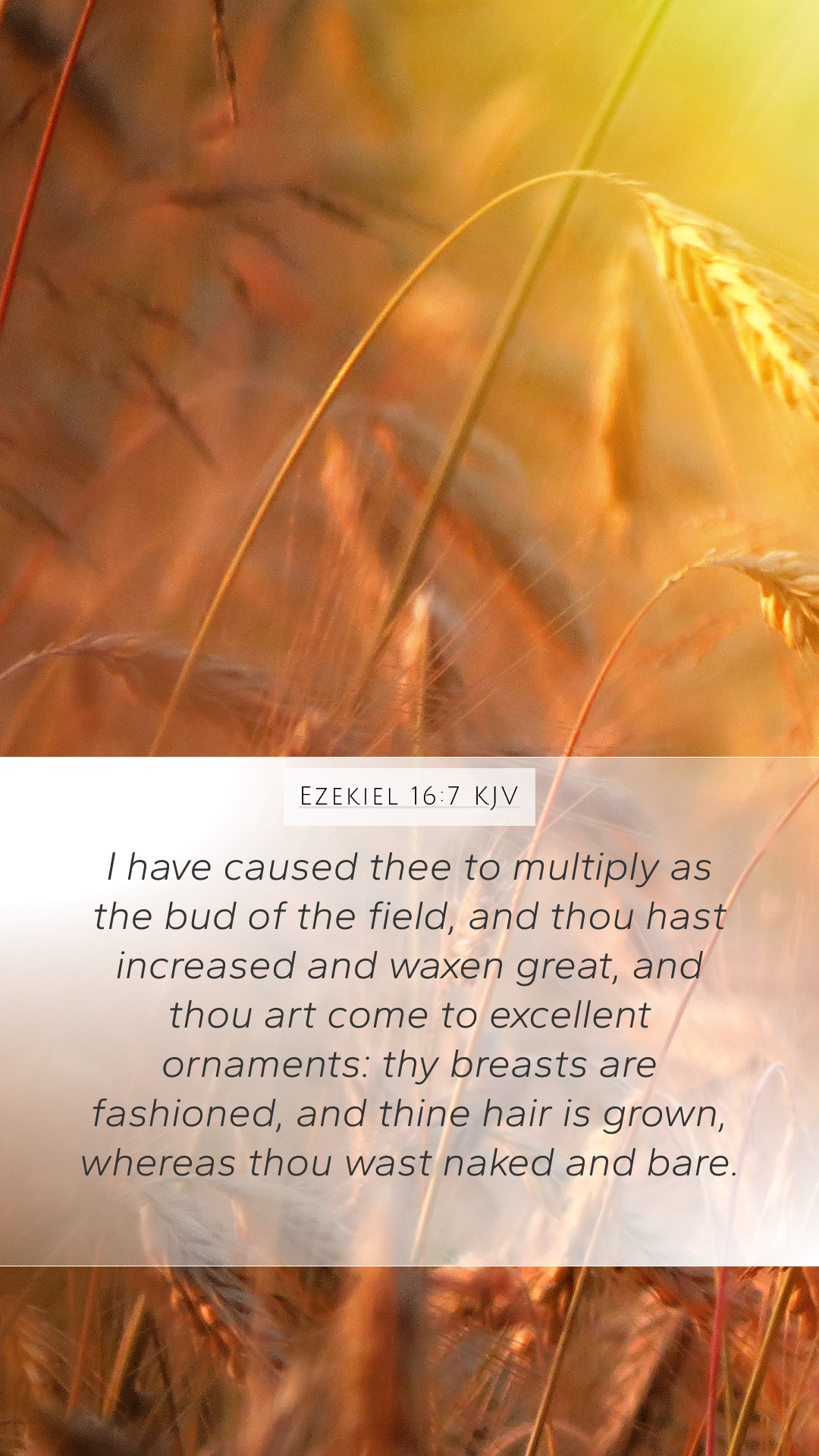Bible Verse Interpretation: Ezekiel 16:7
Ezekiel 16:7 states:
"I made you fruitful like a plant in the field; and you grew up and became tall and arrived at full adornment."
This verse is rich in meaning and requires careful examination to understand its spiritual significance. Below, we summarize insights from public domain commentaries to provide a comprehensive understanding of this passage.
Context and Overview
Ezekiel 16 contains a metaphorical narrative where Israel is represented as a young woman, whom God nurtures and adorns. This chapter highlights God's love and care for Israel, portraying the transformation from a neglected infant to a beautiful and privileged nation.
Summary of Biblical Commentary
- Matthew Henry's Commentary: Henry emphasizes that this passage illustrates God's grace and mercy. He highlights how God has made His people fruitful and prosperous, signifying spiritual growth and abundance. The imagery of a flourishing plant indicates God's nurturing hand in the lives of His people, fostering their development and beauty.
- Albert Barnes' Notes: Barnes notes that the language reflects God's sovereign acts in establishing Israel as a nation. He suggests that the phrase "you grew up and became tall" symbolizes Israel's rise to prominence and the blessings that came with God's favor. Barnes underscores the idea of divine intervention and the importance of recognizing God's role in the prosperity of the nation.
- Adam Clarke's Commentary: Clarke interprets this verse as depicting both physical and spiritual growth. He points out that just as a plant requires sun and water to flourish, Israel needs God's continuous support. Clarke also implies that this growth can be seen as a metaphor for spiritual maturity, cautioning that neglecting God's favor can lead to deterioration.
Key Themes
- Divine Care: The verse highlights God's unfailing love and nurturing spirit toward His people, illustrating the depth of His commitment to their well-being.
- Spiritual Growth: It indicates a journey from humble beginnings to a state of flourishing, emphasizing the transformative power of God's grace.
- Warning Against Complacency: Implicitly, the text serves as a reminder to remain mindful of the source of our blessings, avoiding pride and self-sufficiency.
Application to Daily Life
Understanding the meaning of Ezekiel 16:7 can provide valuable insights for personal spiritual growth:
- Recognize God’s Providence: Acknowledging that our achievements and growth stem from God encourages gratitude and reliance on Him.
- Commit to Spiritual Nurturing: Just as a plant requires care, we must invest time in prayer, study, and fellowship to nurture our faith.
- Encourage Others: Offering support and encouragement to others in their spiritual journeys mirrors God's call to nurture and develop one another.
Cross References
This verse connects with several other scriptural passages that enhance its meaning:
- Psalms 1:3: Compares the righteous person to a tree planted by streams of water, emphasizing growth and blessing.
- Isaiah 61:3: Talks about God providing for those who mourn and giving them beauty instead of ashes.
- John 15:5: Jesus teaches about the necessity of abiding in Him to bear fruit, linking to the theme of dependence on divine support.
Conclusion
Ezekiel 16:7 serves as a profound reminder of God's nurturing love and the importance of both physical and spiritual growth. This commentary offers various perspectives that can deepen our understanding of Scripture and encourage us as we engage in Bible study.
For those seeking to explore Bible verse meanings, interpretations, and applications, this passage exemplifies the significance of recognizing God's grace in our lives.


